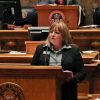On Saturday morning, state Rep. Kyle Mullica, (R-Adams County) was supposed to be at a virtual town hall on the federal and state responses to COVID-19.
But he couldn’t make it. The emergency room nurse was working on the front lines of the crisis.
At some point this year, Mullica will return to his other job at the Capitol, where he and his fellow legislators will face daunting decisions on how to negotiate the coronavirus budget fallout.
At the virtual town hall, Rep. Faith Winter (D-Westminster) said Colorado’s state legislature, which suspended its work last month, could restart its work for up to 51 days later this year.
“We’re working through the money coming from the federal government and what role the legislature will play in allocating that money,” Winter said.
She identified three main legislative agendas.
“Which bills do we need to pass in response to, first, the health care crisis that we’re in? Second, how can we help our economy rebound and our small businesses recover at the state level,” she asked. “Third, it’s really important that we have our democracy stand up strong through this crisis.”
Constitutionally-Mandated Budget
In addition to working through “bills in the system” that Winter described as “mission-critical,” she said that “[some]thing we have to do under the constitution is to pass a budget.”
To address that, she called up state Rep. Dominick Moreno, (D-Commerce City), who serves on the joint budget committee.
“Right before the legislature suspended and went into recess, we were about 98% complete with the budget,” Moreno said. “Now the fiscal outlook for Colorado has changed so dramatically that we will essentially have to start over.”
“We will be receiving a revised revenue forecast on May 12,” Moreno said. “That will help inform finalizing the budget for next year.”
“The situation has gotten much worse,” he said.
“It’s likely to the effect of billions of dollars,” Moreno continued. “In a $33 billion state budget, that’s quite an impact.”
Ongoing Stress Expected
“We now expect that this recession, frankly, is going to last a little longer than expected,” Moreno said. “That will mean that the state will have to be prudent in the decisions that we make and how we spend things like the general fund reserve,” which he said had about $900 million.
“We will have to be thoughtful about how we spend that down, to make sure that the state can still make ends meet,” Moreno said.
That stress on the state government has trickled down to the local level.
“It has been an intense couple of weeks trying to make sure that we have continuity in government and that we’re open for services,” said Adams County Commissioner Emma Pinter.
She said her county is spending “about $7 million in COVID response. That’s $5 million in small business loans, that’s $1 million in grants, and that’s $1 million we’ve specifically allocated to our Adams County Foundation for Emergency Response,” which will assist with programs like rent assistance and food banks.
“We are really blessed to have had really good budgeting for the past few years,” Pinter said. “Given that I have heard that some local governments are doing layoffs or furloughs, I want to reassure you that Adams County has had conversations and we are stable.”
While she did “hear that the city and county of Broomfield is furloughing 250 people,” Pinter said Adams County is “not doing that.”
Still, she said “that if Senator Moreno’s predictions are sadly probably true… we’ll have to have some conversations.”
Change of Plans
“The joint budget committee will be starting on May 4, so about two weeks before the rest of the legislature comes to back to finalize the budget package,” Moreno said.
“The first thing that will go is any new commitments or new programs or expenditures,” he said of a worst-case scenario budget. “I think we’re going to have to postpone any actions on those because the budget simply can’t withstand adding any new programs.”
Moreno also said the state’s recent budget commitments to transportation upgrades will likely also go unfulfilled.
“We don’t want to have to furlough or lay off any state employees… because those are the folks that are keeping the state going while we’re in this pandemic,” he said. “It may mean we can’t give them a raise, like we had anticipated before. That’s a painful decision, but I think it’s a necessary one.”
Moreno and the rest of the budget committee expect federal guidance on an upcoming influx of money from Washington D.C. at some point this week.
“We’re hopeful that some of the federal funds that have been approved will lessen the blow to the state’s budget, but we’re not sure about that,” he said. “There’s been some uncertainty around federal guidance over how we’re able to spend those federal resources coming in.”
“We’re going to see where federal funds can offset some of the general fund commitments to different programs,” so, “hopefully we can keep programs intact but draw upon a different revenue source in order to keep programs whole,” Moreno said.
“If the guidance is broad, in that we can use those federal funds for a variety of shortfalls in the state budget, then obviously the situation isn’t as grim,” he said. “If we do not receive that guidance, however, we will be making significant reductions to existing programs at the state level.”
“We expect an additional package within the next few days, which will be more money for state and local governments,” said U.S. Rep. Ed Perlmutter (D-CO), who also participated in the virtual town hall. “We will try to amend what we did earlier to give state and local governments more flexibility as to how they can use the prior appropriation we made.”
He said, “There will probably be something after that that will be substantial reconstruction to rebuild the economy and get us back on our feet.”



